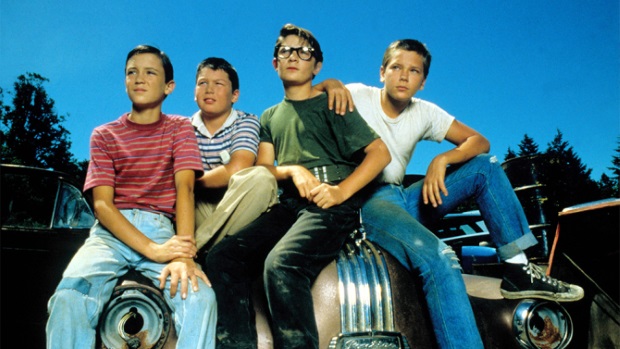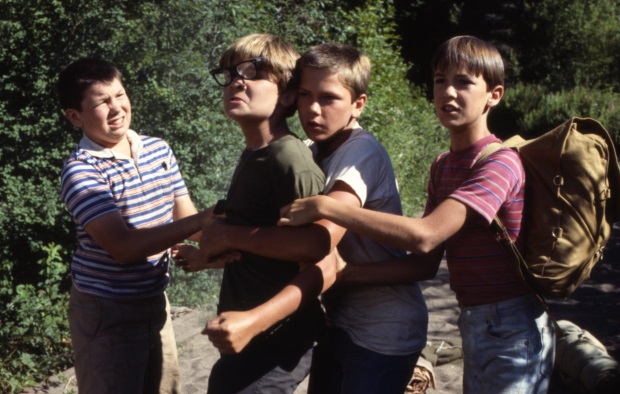Revisiting the film of Stephen King’s Stand By Me
Our lookbacks at the screen adaptations of Stephen King land on a real classic: Rob Reiner's film of Stand By Me...
This article comes from Den of Geek UK.
The film: Four friends living in Castle Rock, Gordie (Wil Wheaton), Chris (River Phoenix), Vern (Jerry O’Connell), and Teddy (Corey Feldman), find out the location of the body of a boy, recently gone missing from a nearby town. Deciding that they want the credit for finding the boy first, the quartet set out on a hike along the river. As the boys make their way across country to the body, they confront their various anxieties, their plans for the future, and the bullies that want to get to the body first.
Based on Stephen King’s novella The Body (subtitled ‘Fall from Innocence’) from the Different Seasons collection, Stand By Me is rightly regarded by most, and King himself, as one of the best adaptations of his work. Having worked my way through a few duds recently in this series of lookbacks, Stand By Me has been looming on the horizon like a glorious sunset. It’s a time-honoured classic, a film that is at once both celebrating childhood, mourning its transience, and recognising the darkness that lurks at the fringes. Rob Reiner approaches the material with a great deal of affection and charm, fearlessly transforming King’s text when he needs to, but never losing the characterisation or the story’s resonance.

Stand By Me is not ostensibly a horror film, instead referred to as a coming-of-age drama, but one of the defining emotions of the story is that of fear. For Gordie, it’s the fear of life without his brother, of never being able to live up to his successes in the eyes of his now-distant parents. For Chris, it’s never having the opportunity to shake off his family’s reputation. Vern is scared of not fitting in, of being the butt of everyone’s jokes, whilst Teddy is marred by the mental scarring of his father and the prospect of inheriting his father’s madness. The horror is not derived from monsters, but from real-life demons that threaten to derail the boys at every turn.
Underpinning the film’s success is the way in which Reiner treats these characters and their respective anxieties with the utmost respect. There’s no condescension here, but sympathy as we watch these boys wrestle with ideas that are perhaps still too big for them to comprehend. Gordie, in particular, must come to terms with the fact that his parents are too consumed by grief for his more popular and outgoing brother to realise how talented a writer Gordie is. Chris acknowledges that everyone around him underestimates him and he is torn between fighting to prove them wrong or simply accepting his lot in life.
It helps that Reiner assembles such a good cast on which he can rely. The four young actors would each go on to varying levels of success and each of them shines here. Phoenix’s tortured Chris is, of course, the standout, but he is complemented by the sombre yet strong performance of Wheaton. O’Connell and Feldman get to do the wackier stuff, but there are still layers to each of their characters that are teased out successfully at the appropriate points. The four of them together have such a strong chemistry that you believe that they are friends who have grown up alongside each other. Crucially too, there’s a quiet tension within their friendship, the sense that they are friends by proximity rather than similarity, which in turn feels like an authentic aspect to their relationships.

When the older Gordie (Richard Dreyfuss) narrates the fates of his three friends at the end of the film, we learn that they did drift apart as a group, with Vern and Teddy remaining locally. Gordie and Chris prove to be the success stories; Gordie goes on to write and escape his brother’s shadow as Chris becomes a lawyer and leaves his wayward family behind. Reiner makes a crucial difference from King’s story, where Vern, Teddy, and Chris all die young. In the film, it is only Chris whose life is cut short, a nasty irony after he finally proved everyone wrong in making a success of himself. It’s an ending made all the more poignant by the real-life tragedy of Phoenix’s early death and even without that extra level, and serves as a harsh reminder that life can be cruel.

And that’s the beautiful clash at the heart of Stand By Me: the myth of the idyllic childhood the boys want and the harsh reality that keeps intruding in it. The sense of loss overshadows the story, whether it’s the prospect of losing their youth to adulthood, their families to grief or alcoholism, even the simple triumph of finding the body first. The body itself becomes the locus of this tension between myth and reality; the boys lose the sense that they are going to find the remains of a boy in wrapping it up as an adventure. As they get closer to finding him, the weight of what they are doing sets in. The final confrontation with Ace and his gang is the final break between myth and reality, but the boys come out on top.
One of the few King adaptations that can be genuinely called a masterpiece, Stand By Me is understandably a favourite for many. It’s heartwarming, thrilling, melancholic, and full of humour yet with an underlying seriousness that treats the hopes and fears of children with the respect that it deserves. It’s a film that is always a joy to revisit and to experience its heady emotions again. If you haven’t seen it for a while, I’d heartily recommend taking the trip with Gordie, Chris, Vern, and Teddy once again.
Scariest moment: Stand By Me may not have many traditional scares (though the leeches and the train encounter are suitably hair-raising), but for me, it’s the chilling sense that death is never far away that gets to me when watching the film.
Musicality: The soundtrack to Stand By Me is the perfect accompaniment to the time period of the film, as well as amplifying the sense of small town Americana that runs through both King’s novella and Reiner’s adaptation.
A King thing: The loss of innocence. It’s a common thing for the children of King stories; the Losers’ Club of It springs to mind, but it’s an experience that adults also endure in some of King’s works as they become alerted to the more monstrous presences lurking in the shadows.
Join me next time, Constant Reader, for a trip to the Creepshow 2…
